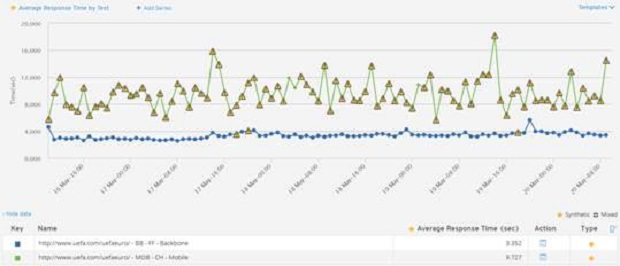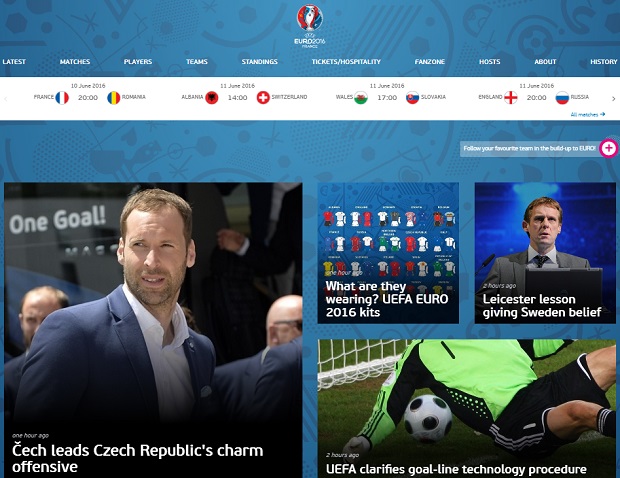Football fans on the move could be set for frustration, waiting three times longer for UEFA mobile site compared to desktop, according to a ‘fitness test’ review from a digital performance firm.
Dynatrace has carried out some ‘digital fitness tests’ on the website UEFA has built for Euro 2016 ahead of its kick-off this week.
Digital performance experts have been monitoring how quickly the UEFA Euro 2016 site loads from desktop and mobile devices across Europe. Key findings include:
· A kick in the teeth for FIFA: At first glance, UEFA certainly seems to have shown FIFA a thing or two about building a website with an optimised user-experience. Whereas the World Cup 2014 site was rife with design flaws that caused its content-heavy homepage to strain, UEFA has made great use of local infrastructure and page optimisation techniques to ensure users can access the site quickly and easily wherever they are, despite the high level of image and video content. See here for more details on the FIFA analysis.
· A fumbled pass to mobile devices: Despite generally successful efforts to optimise the site for mobile devices, UEFA fell short for users in Italy and Spain, who are experiencing excruciatingly slow page load times as a result of poor local network infrastructure that the developers have failed to account for. These regions have dragged the average page load time down excruciatingly to almost 10 seconds!
· Better news for the UK and France: However, it’s worth noting that it’s good news for fans in the UK and France – who respectively only have to wait three and four seconds on average for the mobile site to load – what a difference! France also topped the league table for desktop performance, trailed closely by the UK, with less than half a second between the two at a little over one second each.
Dynatrace tested and analysed four critical pages of the Euro 2016 site from the perspective of desktop and mobile users in the UK, France, Germany, Spain and Italy to identify how good the user experience will be during the tournament. Results reveal the website has been built with performance in mind for desktop devices, but efforts to optimise it for mobile devices haven’t been able to find the back of the net, with the mobile site taking on average three times as long to load.
Key findings of the analysis revealed:
· Efforts to optimise the website for mobile devices have hit wide of the post, with pages taking on average three times as long to load as they do on desktops
· Fans in Italy and Spain are being let down by poor mobile network services, causing them to suffer significantly longer page load times than other regions
· Desktop site has been well configured, with the developers making good use of optimisation techniques and local infrastructure in each country
Desktop site
The tests revealed that all four of the pages are performing well for users across Europe, with average response times coming in lower than, or very close to, three seconds (Fig. 1). Key contributing factors include:
· The use of a well-configured Content Delivery Network (CDN) has countered any performance impact from the high quantity of images and video used
· France topped the league table with an average homepage response time of a little over one second which suggests site content is hosted locally, with other countries being served by a CDN
· Content has been configured to cache on the user desktop, so the page loads significantly faster on repeat visits
· Low use of third party services whose performance can’t be controlled by UEFA
“With such a media-rich homepage, the Euro 2016 site could very easily have been a disaster from a performance perspective,” said Michael Allen, Solutions VP, Dynatrace. “However, the developers have really nailed the basics of web design 101 to make sure fans across Europe don’t have to add the pain of a slow site to the already nerve-shredding tension. It’s particularly refreshing to see so few third-party services in use. There’s always a trade-off between speed and functionality with these integrations, as they can degrade the performance of the core website. The developers of the Euro 2016 site are clearly taking no chances, by keeping those third-parties to a minimum.”

Mobile site
The analysis revealed that the developers of the Euro 2016 site have taken steps to optimise it for mobile devices, by reducing the page size from 3.5MB to 2.7MB. However, these measures have not been enough, with the average homepage response time three or more times higher on mobile devices as on desktops (Fig. 3). The designers have tried to counter this by configuring the most important content to load first. However, with such a media rich homepage, users will usually wait for the page to load fully before they start browsing.
Breaking down the data on a country-by-country basis, the picture looks much brighter for users in the UK, France and Germany, which had average response times of between three and six seconds. Users in Spain and Italy have to wait significantly longer, with response times of around 16 and 18 seconds respectively (Fig. 4). Further analysis revealed these delays are caused by the quality of the networks in Italy and Spain, which offer less bandwidth than in the other countries.

“There’s no one-size-fits-all approach to website design for a global market,” continued Michael Allen. “There are so many factors that impact on the performance of a website from one country to another; from the physical network infrastructure to government policies on social media. This is why it is so important for companies building a website on the global stage to benchmark its performance on a country-by-country basis, to understand these factors and identify how to address them. The good news for fans in Spain and Italy is that the delays they’re experiencing with the mobile site could easily be fixed by removing some of the video and image content to reduce the size of the site.”

